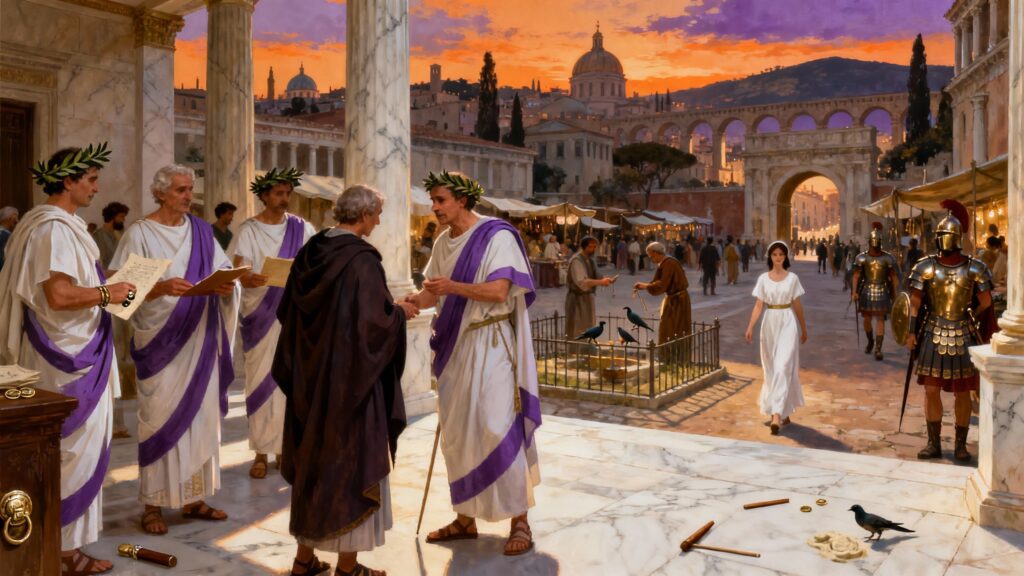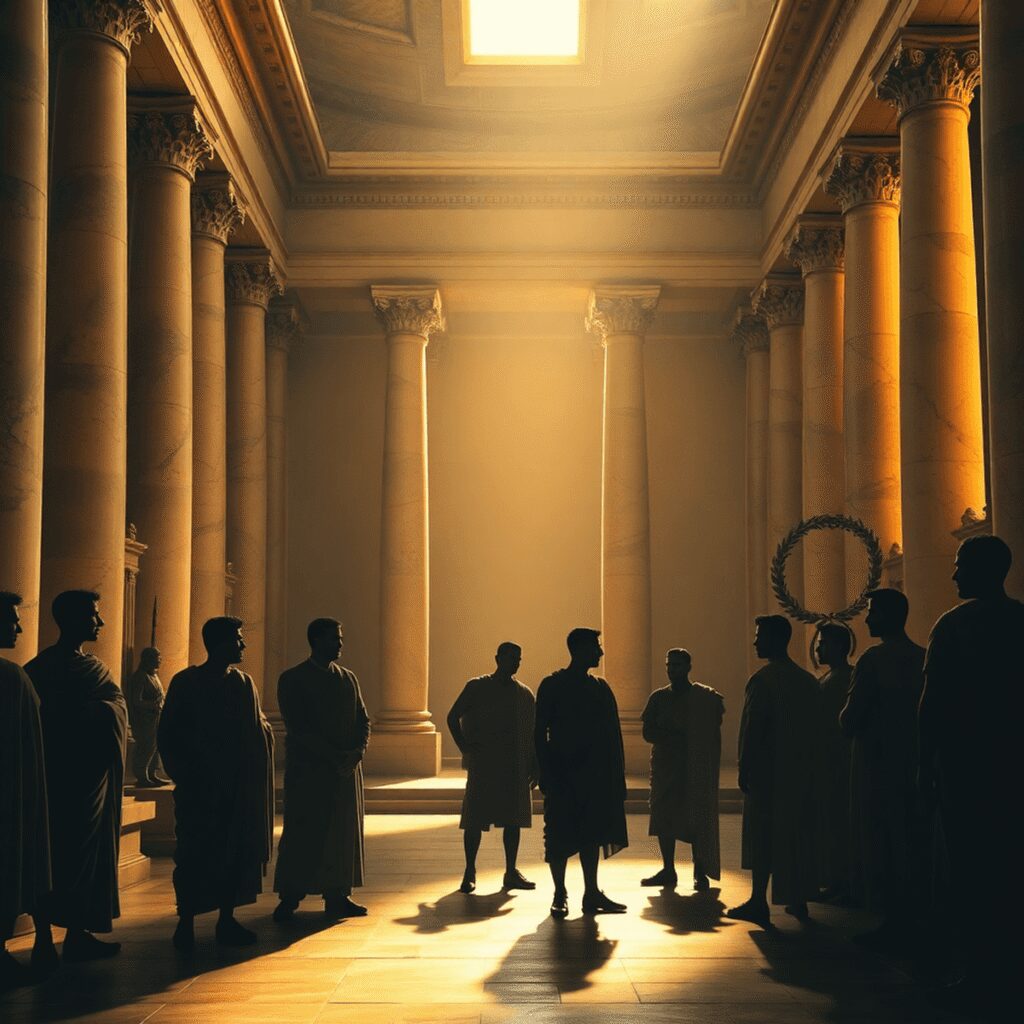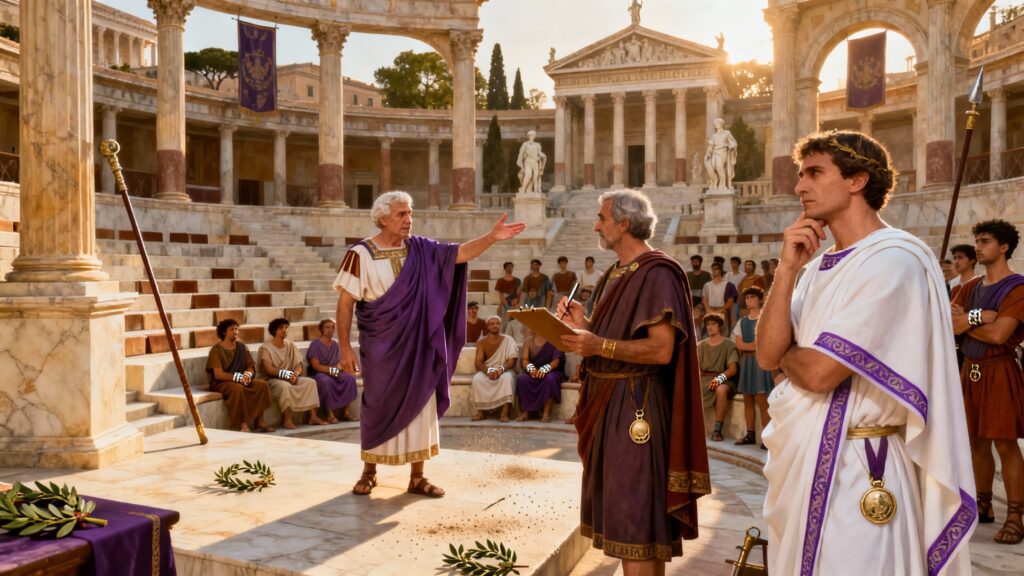The Roman Senate was a crucial part of how ancient Rome was governed for many centuries. It played a key role in deciding military strategies, managing finances, and handling diplomatic affairs. But the Senate was more than just a place where laws were made; it was also a space where the powerful elite of Rome used their influence and traditions to gain control.
The Secret Lives of Roman Senators: Power Beyond the Senate delves into the ways in which senators wielded power beyond their official responsibilities in the Senate. Their influence extended beyond formal meetings and decisions, reaching into social circles, religious institutions, and public opinion.
By studying the various ways in which Roman senators held power, we can gain insight into how they maintained their authority over society. This understanding sheds light on political choices made behind closed doors, impacts critical aspects of everyday life such as agriculture (a vital component of Rome’s economic and social growth), and establishes precedents that carried on into the imperial period.
To fully comprehend how ancient Rome was governed, it’s essential to look beyond the Senate itself and explore the hidden lives of its senators. These individuals not only influenced politics but also had significant involvement in military events—much like Scipio Africanus, whose tactics during the Second Punic War secured Rome’s supremacy over Carthage. Moreover, legal systems such as the Corpus Juris Civilis continue to shape contemporary law today—a testament to the lasting legacy left by these senators beyond their immediate political realm. Additionally, their personal experiences often intersected with wider cultural shifts, including the rise of Stoicism, which had a profound impact on Roman philosophy.
The Formal Role of Roman Senators in the Senate
The Roman Senate during the Republic was composed primarily of former magistrates and members of aristocratic families. Selection rested largely with the censors, officials responsible for maintaining the senatorial rolls. This process ensured that senators met strict property qualifications, reflecting Rome’s emphasis on wealth as a prerequisite for political authority. Once appointed, senators held their position for life unless removed for misconduct.
Senatorial duties centered on advisory and strategic functions rather than formal legislative authority. The Senate guided major decisions on military campaigns, financial policies, and diplomatic relations. It exerted control over state resources and appointed magistrates to execute policies. Despite lacking direct law-making power, its recommendations—senatus consulta—were highly influential and typically obeyed by magistrates and popular assemblies.
The concept of auctoritas was fundamental to understanding senatorial power. This term referred to a senator’s moral and political influence, which could shape public opinion and government action beyond written laws. A senator’s auctoritas derived from experience, reputation, and social standing, making it a potent force within Roman governance. This intangible authority gave senators leverage to steer decisions without coercive power, emphasizing persuasion over command within the Republic governance system.
The powers held by the Senate were instrumental in shaping various aspects of Roman society including its military strategies, as explored in this article about how military might shaped an empire. Furthermore, the Senate’s influence extended to areas such as engineering and infrastructure development which are discussed in detail in this piece on incredible Roman engineering feats.
Additionally, the cultural impact of Roman mythology can be traced back to this period of governance, an aspect that sheds light on the influence of Roman mythology on modern culture. The social structure enforced by the Senate also played a role in shaping the lives of gladiators during this time, a topic further explored in our article about gladiators as heroes or victims. Understanding these dynamics requires an exploration into the birth of the Roman Republic, marking a critical shift from monarchical rule to a republican system.
Power Through Personal Networks and Patronage
Roman senators extended their influence far beyond formal Senate debates by cultivating extensive patronage networks. These personal relationships served as vital channels for exercising power within the Roman aristocracy. Senators acted as patrons to a wide range of clients—individuals or groups who relied on their protection, support, or resources. This system created reciprocal obligations: patrons offered legal aid, financial assistance, or political backing (a reflection of the principles laid out in Roman law), while clients delivered loyalty, votes, and public support.
The patron-client relationship was not merely social; it formed the backbone of political alliances that shaped Rome’s political landscape. Senators leveraged these connections to consolidate power by:
- Building loyal followings across different social strata
- Influencing electoral outcomes through coordinated voting blocs
- Encouraging public favor by distributing favors and resources
Personal alliances often transcended official Senate activity. Senators used these networks to sway public opinion, ensuring that their proposals found support both inside and outside the Senate chamber. Political alliances forged through patronage could determine the success of legislation, appointments, or military commands.
Such social influence made patronage an indispensable tool for maintaining status and authority in Roman society. It reinforced the senator’s position in the elite hierarchy while embedding them deeply into the everyday political fabric of Rome.
The patricians, who were wealthy landowners and part of this elite class, played a significant role in this patronage system. Their wealth allowed them to offer more substantial support to their clients, thus strengthening their political influence and power within Roman society.

Oratory and Debate: Shaping Decisions Beyond Formal Rules
Senatorial debates were different from today’s legislative assemblies. There were no strict time limits for speakers, and senators didn’t have to follow party lines. This environment allowed for long, lively discussions where an individual’s skill in speaking could greatly influence decisions.
- Senators used speeches not only to present arguments but also to appeal emotionally and morally to their peers.
- The art of political persuasion was essential; a well-delivered speech could sway opinions and forge agreement.
- Unlike rigid voting groups, senators formed flexible alliances based on arguments made during these debates.
The Senate’s recommendations, known as senatus consulta, often reflected the power of such speeches. While lacking formal legislative force, these resolutions carried significant weight because they emerged from persuasive discussions among Rome’s elite.
In The Secret Lives of Roman Senators: Power Beyond the Senate, it becomes clear that mastery of oratory granted senators influence extending far beyond official duties. Their ability to shape policy through debate was a critical means of exercising authority in Roman governance.
Religious Authority as a Source of Political Power
In ancient Rome, religion and politics were closely connected. Roman senators often held important religious positions called priesthoods, which combined their political power with Rome’s spiritual life. These priesthoods included prestigious roles like the Pontifex Maximus, Augurs, and members of the College of Vestals or Flamines. Being in such positions elevated a senator’s status beyond just being a politician, giving them a sacred presence that strengthened their authority.
The Role of Senators in Religious Rituals
Senators played a crucial role in religious rituals that went beyond mere ceremonies. These rituals were essential for maintaining a connection between senators and Rome’s traditional state religion, as well as its underlying beliefs. Public ceremonies, sacrifices, and festivals all required the participation of senators, symbolizing their responsibility as protectors of Rome’s divine favor. This relationship with the gods validated their leadership and provided a religious justification for political decisions.
How Political Power and Religion Reinforced Each Other
The combination of political power and religion supported the Roman state’s ideology by grounding governance in sacred customs. Senators acted as intermediaries between the people and the divine, ensuring that Rome upheld pax deorum—peace with the gods—which was believed necessary for the city’s prosperity.
Here are some ways in which this blending of religious authority with political roles impacted Roman society:
- Religious officeholders influenced both public opinion and policy by invoking divine approval.
- Participation in rituals strengthened unity among the elite through shared spiritual responsibilities.
- The sacred duties emphasized senators’ legitimacy in exercising power across various areas.
This integration of religious authority into political functions created an additional source of influence that worked alongside formal Senate activities, making senators essential figures within Roman society.
Implications for Other Segments of Society
However, it’s important to note that this complex system of governance and religious authority also affected other parts of society.
- The legal status of Roman women reflected a complicated mix of rights and limitations shaped by their relationships with men such as fathers or husbands.
- Not all Romans enjoyed the benefits associated with these powerful positions; the plebeians were a diverse group who did not belong to the patrician elite.
- This period saw remarkable artistic expressions influenced by earlier Greek and Etruscan traditions, evident in art and culture from that time.
The story of Rome is not only one of conquest and expansion but also a narrative filled with innovation, culture, and governance that has left an enduring impact on the world.

Transition from Republic to Empire: Changing Dynamics of Senatorial Power
The rise of the Roman Empire marked a fundamental shift in the balance of power between the Senate and the emperor. During the Republic, the Senate held considerable influence over state decisions, but with imperial rule, constitutional authority increasingly centralized in the hands of the emperor. This change diminished the Senate’s role as the primary governing body.
Key Developments
Key developments included:
- Emperor Authority: The emperor assumed ultimate control over military command, legislation, and administration. While the Senate retained formal recognition, its decisions required imperial approval. The emperor’s power often overshadowed senatorial influence, turning the Senate into an advisory body rather than a decisive institution.
- Senate Membership Control: Emperors gained direct control over who could join or remain in the Senate. Membership criteria became more selective and politically motivated under imperial influence. By reducing Senate size and carefully managing appointments, emperors ensured loyalty and minimized opposition within this elite circle.
- Reduction in Size: The number of senators was curtailed from several hundred to fewer than 200 under some emperors. This smaller body allowed for easier manipulation and supervision by imperial authorities.
This transformation reshaped Roman politics, embedding senatorial power within a framework dominated by the emperor’s supremacy. Senators continued to wield social prestige but operated under constraints that limited their independent political maneuvering.
To understand this transition better, one can explore various aspects of Ancient Rome, such as its political evolution from a Republic to a mighty Empire or even delve into its infrastructural marvels like Roman roads, which played a significant role in maintaining and expanding the empire.
Social Status and Wealth as Instruments of Influence
The Secret Lives of Roman Senators: Power Beyond the Senate reveals that wealth formed the bedrock of senatorial influence. Senators were among the aristocratic elite, controlling vast estates and financial resources that reinforced their authority across Roman society. This wealth was not merely a sign of prosperity but an active tool for maintaining political and social dominance.
Key aspects include:
- Economic Foundation: Landholdings, rental incomes, and commercial ventures provided senators with continuous revenue streams. This financial stability allowed them to sponsor public games, fund building projects, and support clients—actions that enhanced their visibility and prestige.
- Social Prestige: Membership in the Senate placed individuals at the summit of Rome’s hierarchical structure. Senators’ noble lineage and accumulated wealth combined to create an aura of superiority recognized by both peers and common citizens.
- Cultural Capital: Wealth enabled senators to engage in luxury lifestyles, patronize arts, and participate in exclusive social circles. These activities further distinguished them from other classes and solidified their elite status.
Senators’ social standing extended their power far beyond formal political arenas. Their economic might and aristocratic prestige functioned as invisible levers, shaping influence in subtle but potent ways throughout Roman life. However, it’s important to note that daily life in ancient Rome varied vastly for different social classes. The stark divide between patricians (the aristocratic class) and plebeians (the commoners) significantly influenced their daily activities, traditions, and overall way of living.
Decline of Practical Senatorial Power and Symbolic Legacy
The practical authority of the Roman Senate waned significantly during late antiquity, driven largely by imperial reforms. Emperors like Diocletian centralized power, restructuring the administration to reduce the Senate’s direct involvement in governance. These reforms shifted key functions—such as financial control and judicial authority—away from the Senate and into imperial hands, effectively sidelining senators from decision-making processes.
Political instability further eroded senatorial influence. The Gothic Wars and other military crises destabilized Rome and its institutions, weakening the traditional aristocratic network that sustained senatorial power. Senators found themselves less able to exert control over provincial matters or influence imperial policies as external threats and internal conflicts took precedence.
Despite losing much of their formal power, senators retained a symbolic legacy as representatives of Rome’s enduring aristocratic tradition. Their continued presence in ceremonial roles, religious offices, and civic rituals preserved a sense of continuity with the Republic’s past. This symbolic status maintained the prestige of senatorial families even as their practical authority diminished.
Key Factors Contributing to the Decline of Senatorial Power
- Imperial reforms reduced Senate size and membership control.
- Loss of administrative functions marked a shift to ceremonial roles.
- Military conflicts disrupted traditional patronage and governance.
- Senators embodied Rome’s historical identity beyond political clout.
The decline was not a sudden collapse but a gradual transformation from active rulers to custodians of Roman heritage within an evolving imperial framework. This heritage is evident in Roman architecture, which stands as a testament to their power and cultural identity despite the diminishing political clout of the Senate.

Conclusion
The power of Roman senators went far beyond the official meetings in the Senate. They had a significant impact on Roman politics through various means:
- Social networks: Senators used their connections to control alliances and distribute favors.
- Religious roles: They combined political power with religious traditions, reinforcing their authority.
- Informal channels: Through persuasive speeches and personal reputation, senators influenced public opinion.
The book The Secret Lives of Roman Senators: Power Beyond the Senate provides insights into this intricate system where formal titles only provide a glimpse into the true dynamics of power. It shows that the legacy of senators is not only found in laws or decrees but also in their ability to exert moral and political influence (auctoritas) over Rome’s governance for centuries.
The broader context of power during the Roman Republic
This power structure was not limited to senators alone. The structure of power during the Roman Republic marked a significant shift from monarchy to a more complex political system, laying the groundwork for modern democracies. It’s important to understand that these official systems often existed alongside informal power structures that played a crucial role in shaping history.
The multifaceted nature of senatorial authority
Additionally, the Twelve Tables, which were the first attempt to codify ancient Rome’s complex legal practices, further illustrate how legislation was just one aspect of senatorial power.
The social dimensions of senatorial influence
Beyond politics and law, the senators’ influence also extended into social aspects of Roman life. The role of entertainment as a crucial part of society, with activities such as gladiators, chariot races, and theaters, had significant effects on social relationships and political authority.
The significance of informal power structures
Ultimately, understanding these hidden dimensions enriches your grasp of ancient Rome, highlighting how informal power structures often dictated the course of history as much as constitutional frameworks did. This deeper insight into senatorial roles challenges simplified views and showcases the enduring significance of their multifaceted legacy.
The lasting impact of Ancient Rome
The legacy of Ancient Rome, from its inception as a small city-state to its transformation into a vast empire, remains a cornerstone of Western civilization and continues to resonate in various aspects of modern society.
FAQs (Frequently Asked Questions)
What was the formal role of Roman senators during the Republic?
During the Roman Republic, senators were selected based on property qualifications and held lifetime tenure. Their formal role involved advisory and strategic functions within the Senate, which lacked formal legislative power. Senators wielded auctoritas, a form of moral and political influence that shaped governance.
How did Roman senators extend their power beyond formal Senate duties?
Roman senators extended their influence through personal networks and patronage systems. By leveraging patron-client relationships and forming political alliances within the aristocracy, they consolidated power, influenced public opinion, and affected electoral outcomes beyond their official senatorial roles.
In what ways did oratory and debate enhance the power of Roman senators?
Senatorial debates in Rome were characterized by the absence of strict time limits or party discipline, allowing senators to use rhetoric and persuasive speeches effectively. This mastery of oratory helped shape policy decisions and senatus consulta, amplifying their influence beyond formal rules.
What role did religious authority play in augmenting senatorial power in ancient Rome?
Many Roman senators held priesthoods and participated in religious rituals that reinforced their social status. Their involvement in Rome’s traditional state religion linked them to ideological authority, thereby enhancing their political power through religious legitimacy.
How did the transition from Republic to Empire affect the power dynamics of Roman senators?
With the rise of the Roman Empire, constitutional power shifted significantly from the Senate to the Emperor. Emperors reduced Senate size and controlled membership, diminishing senatorial autonomy and practical authority while maintaining its symbolic status.
What factors contributed to the decline of practical senatorial power in late antiquity?
Imperial reforms under rulers like Diocletian, coupled with political instability during events such as the Gothic Wars, led to a decline in the functional authority of the Senate. Despite this decline, senators retained a symbolic legacy within Roman political culture.

